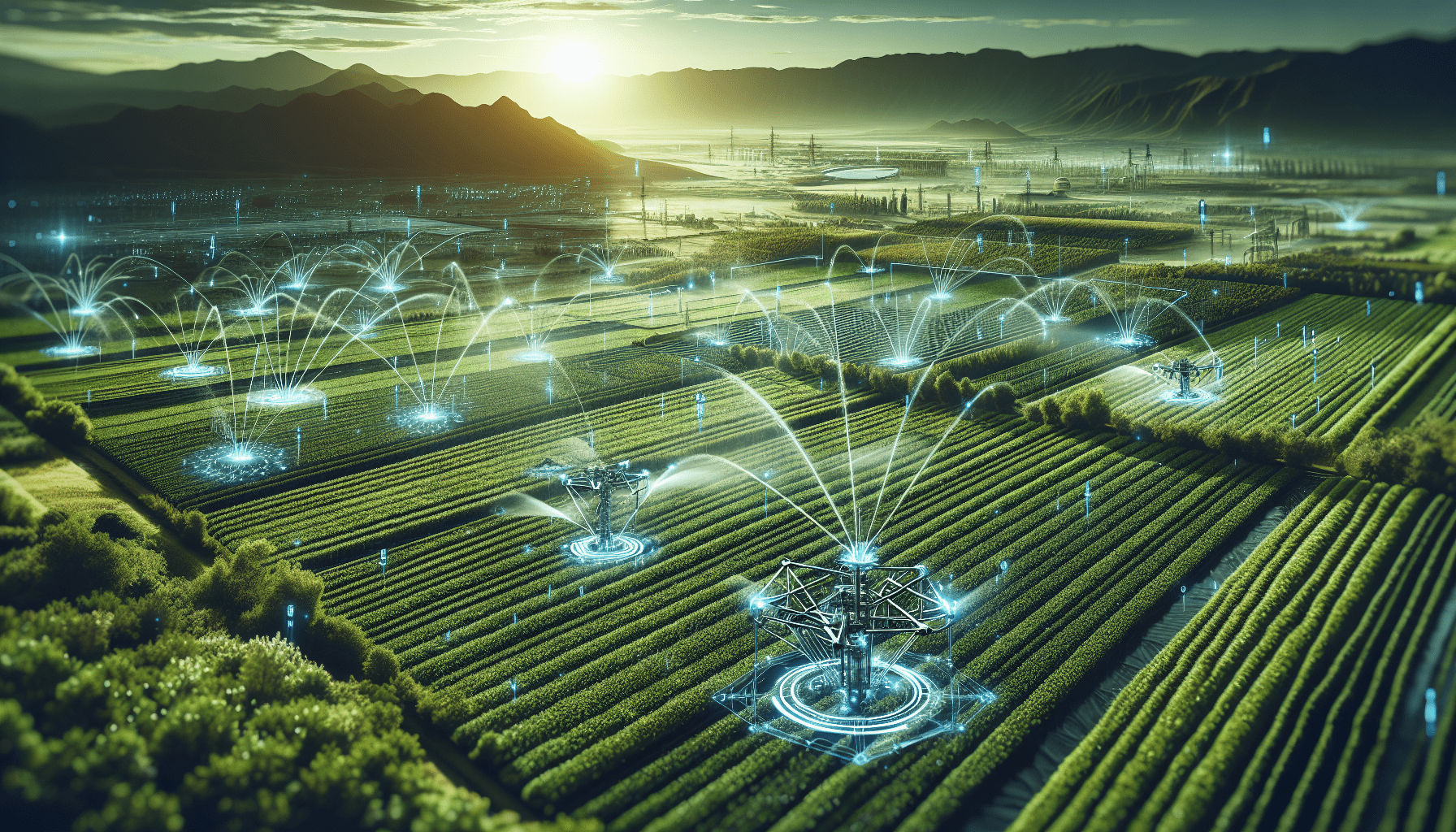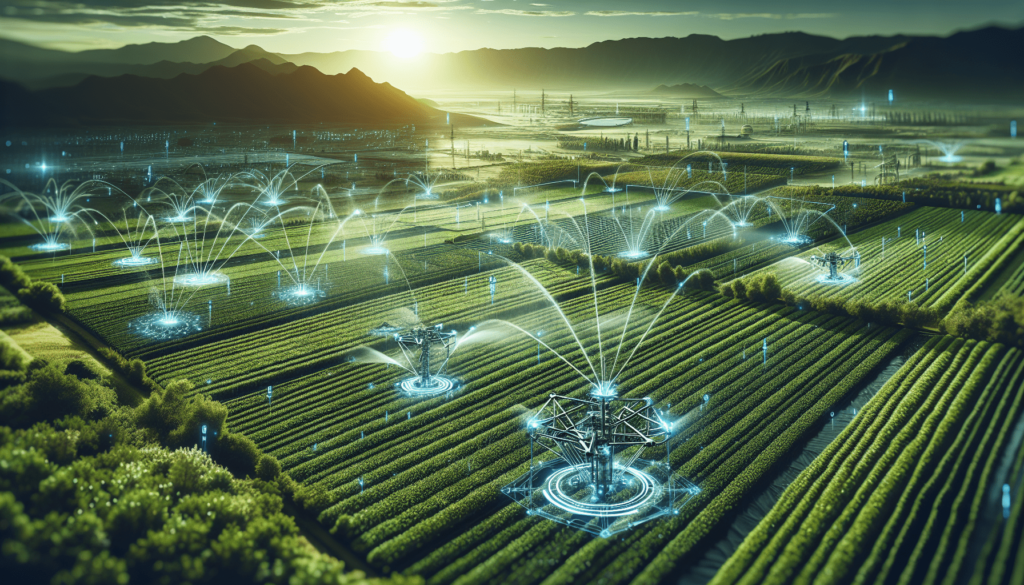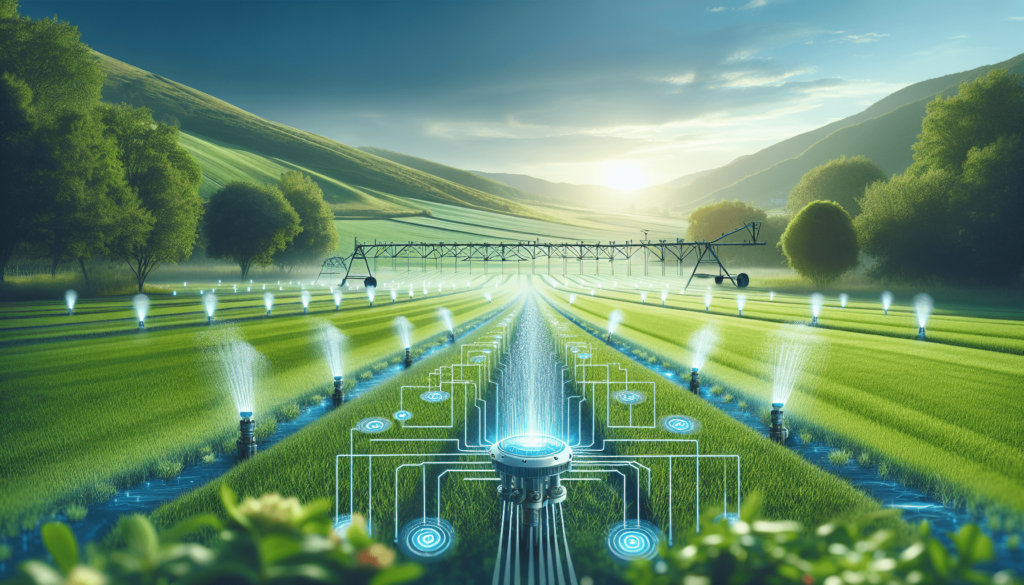
Imagine the possibility of maintaining your lush, green lawn without the worries of water wastage. With the advent of smart irrigation technology, you can now make this a reality. This comprehensive guide, “How smart irrigation systems Contribute To Water Conservation” explores the function of intelligent watering systems in detail, emphasizing the critical role they play in conserving water. Learn about innovative and tech-savvy methods of watering your greens efficiently and see how much water, time, and money you could potentially save. So, gear up to change the way you hydrate your yard or garden in an environmentally friendly manner!

Definition of Smart Irrigation Systems
Welcome to the wonderful world of smart irrigation systems! These are technological devices with a unique purpose – they help regulate and control the watering of lawns, farms, and gardens. The key word here is ‘smart’. These systems employ modern technology factors in weather data, soil conditions, evaporation, and plant water use to adjust watering schedules. The goal? To provide optimal hydration for plants while conserving our precious water resources.
Types of Smart Irrigation Systems
The beauty of technology is the range of options it provides. Smart irrigation systems are no different and come in various types. Among them are weather-based systems (also known as evapotranspiration systems) and sensor-based systems. Weather-based systems use local weather data to determine watering schedules, while sensor-based systems use moisture sensors placed in the soil to monitor water levels in the earth.
Components and Functionality of Smart Irrigation Systems
The heart of any smart irrigation system is its controller – the boss, if you may. It’s the command center that applies user-defined settings and information from sensors to optimize water delivery. Other components include flow meters, rain sensors, moisture sensors, and wind sensors, to mention but a few. The functionality of these systems is quite remarkable. They apply the ideal amount of water, at the right time, given the current weather and soil conditions. This precision reduces wastage and promotes healthy plant growth.
Pros and Cons of Smart Irrigation Systems
Like everything else, smart irrigation systems have their upsides and downsides. On the positive side, these systems promote healthy plant growth, conserve water and could help reduce your water bill. They’re particularly beneficial in regions where water is scarce or expensive. However, smart irrigation systems come with a cost. Initial setup might be expensive, and they require ongoing maintenance. Some people may also find the technology complicated to use. Nonetheless, the benefits often far outweigh the costs.
Water Conservation: The Growing Need
Now that you understand smart irrigation systems, let’s talk about the undeniable importance of water conservation. Fresh water is finite. If we continue to exhaust it uncontrollably, it means trouble down the line.
Impact of Water Usage on the Environment
Every drop of water that we use (or waste) has a ripple effect on our planet. Excessive water usage can deplete natural resources, disturb ecosystems, and alter habitats. To make matters worse, treating and transporting water uses energy, contributes to greenhouse gases, and furthers our carbon footprint.
Role of Agriculture in Water Consumption
Did you know that agriculture uses a significant share of the world’s freshwater? It’s a necessity for crop and livestock production, but often times, the water usage is inefficient. This inefficiency places a heavy burden on water resources, making it crucial for the agricultural sector to implement smart, sustainable methods, like the smart irrigation systems we’ve been chatting about.
Concerns over Limited Freshwater Resources
Our planet is replete with water, but only a small fraction is fresh and accessible. As our population grows and climate change advances, this limited resource is under immense threat. It’s apparent that we need urgent strategies to safeguard our freshwater supplies, one of which is improving the efficiency and intelligence of our irrigation systems.
Smart Irrigation Systems and Precision Watering
Now you might be wondering what precision watering is. Simply put, it’s the accurate application of water in the right place, at the right time, and in the right amount. Sounds like a job for our smart irrigation systems, right?
What is Precision Watering?
Precision watering is an intricate dance of efficiency, timing, and control. It’s designed to maximize water usage while minimizing waste. Gone are the days of blindly watering. With precision watering, it’s all about giving plants what they need, nothing more, nothing less.
Benefits of Precision Watering
The merits of precision watering are aplenty. For starters, it promotes healthy plant growth and prevents disease and fungus, caused by either overwatering or underwatering. It also makes judicious use of water, making it economically and environmentally beneficial.
Role of Smart Irrigation in Precision Watering
Smart irrigation systems are the torchbearers of precision watering. They assimilate data to determine the ideal watering schedule which translates to efficient and effective watering. You can say goodbye to guesswork!

Efficiency of Smart Irrigation Systems
What makes smart irrigation systems ‘smart’ is their efficiency. Let’s delve into this a little deeper.
Water Use Efficiency
The number one job of smart irrigation systems is to optimize water use. By adjusting to changing weather and soil conditions, they ensure every drop counts. This prevents overwatering and runoff, allowing for substantial water conservation.
Energy Efficiency Associated with Smart Irrigation
Did you know that by managing water, you manage energy too? Smart irrigation systems reduce energy use by eliminating unnecessary watering. Less water to treat and transport equals less energy consumed!
Cost Efficiency
Your wallet benefits as well with smart irrigation. Although the initial investment may be higher, over time, the savings in water and energy costs make these systems more cost-effective in the long run.
Weather Based Smart Irrigation Systems
Now to the crux of smart irrigation systems – weather-based and sensor-based systems. Up first, weather-based systems.
How Weather-Based Systems Work
Weather-based irrigation systems are like meteorologists for your lawn. They use local weather data or historic weather patterns to adjust watering schedules. Some even directly connect to local weather stations to stay updated in real-time. Very tech-savvy!
Advantages of Weather-Based Smart Irrigation
These systems have the edge as they adjust to live weather data. This capability allows for responsive watering schedules that can be altered with every weather change. Plus, no need to worry about watering on rainy days as these systems have got you covered!
Limitations of Weather-Based Systems
Despite their numerous advantages, weather-based systems have their drawbacks. These systems depend heavily on the accuracy of weather data and forecasts, which we all know can sometimes get it wrong. Also, they don’t account for soil conditions.
Sensor Based Smart Irrigation Systems
Next up are sensor-based smart irrigation systems.
How Sensor-Based Systems Work
Sensor-based systems dip their toes in the soil, literally. They use sensors buried in the soil to monitor moisture levels. When the soil’s too dry – they signal for water, too wet – they hit the brakes. It’s a direct, real-time monitoring system.
Advantages of Sensor-Based Smart Irrigation
These systems provide detailed insight into the soil’s water content, enabling precise watering. They can be ideal for landscapes with different soil types or plants with various water needs. Plus, no worry about local weather data accuracy here!
Limitations of Sensor-Based Systems
Although nifty, sensor-based systems come with their compromises. The accurate placement of sensors can be tricky, and they require periodic maintenance. Plus, they don’t adjust for weather predictions, which can lead to unnecessary watering if a shower is on the horizon.
Integration of Smart Irrigation with Other Technologies
The ongoing technological revolution can turbocharge smart irrigation. Several technologies can heighten the smartness of these systems.
Smart Irrigation and Internet of Things (IoT)
The Internet of Things (IoT) allows connected devices to communicate and exchange data. Imagine your smart irrigation system sending you updates on your smartphone about gardening trends or warnings about equipment failure. Welcome to the future of irrigation!
Role of Machine Learning and Artificial Intelligence in Smart Irrigation
Adding Machine Learning and Artificial Intelligence (AI) into the mix could take smart irrigation to another level. These technologies enable systems to learn from past performance and predict future needs, making irrigation even more proactive and precise.
Future Opportunities
Only the tip of the iceberg of smart irrigation potential has been unveiled. With relentless technological advancements, the scope for smarter, more efficient, and user-friendly irrigation options will rise, leading to unprecedented water management levels.
Case Studies and Examples of Effective Smart Irrigation
Several success stories attest to the effectiveness of smart irrigation. Let’s inspire you with a few of them.
Success Stories in Commercial Agriculture
Commercial farmers have reaped the benefits of smart irrigation in improving crop yield while reducing water use. In many cases, these systems have been instrumental in turning arid lands into prosperous farms.
Improvements in Residential Water Consumption
On a smaller but no less important scale, homeowners are enjoying greener lawns and lower water bills, thanks to smart irrigation. It’s a win-win situation for all parties involved – humans, environment, and plants!
Impact on Public Spaces and Municipal Water Use
Even public spaces like parks and golf courses have jumped on the smart irrigation bandwagon. They serve as a testament to the gains in water conservation and financial savings that these systems can bring to sectors with significant landscape watering needs.
Barriers to Adoption of Smart Irrigation Systems
Unfortunately, all systems go does not apply to smart irrigation adoption just yet. Some hurdles need to be overcome.
Initial Investment and Cost Concerns
The initial cost of setting up smart irrigation systems can be significant, serving as a hindrance for many potential users. However, it’s paramount to view this as a long-term investment that will pay for itself in water and energy savings down the line.
Lack of Knowledge and Technical Expertise
For some, the thought of getting to grips with high-tech systems could be daunting. Therefore, providing more information and support could help more people embrace this water-saving technology.
Resistance to Change and Adoption of New Technologies
Resistance to change is a universal phenomenon, and smart irrigation is no exception. Convincing traditional users to shift to new techniques is a challenge. However, with education, awareness, and time, more people will understand the benefits that these systems bring.
Policies, and Initiatives Encouraging Water Conservation Through Smart Irrigation
Policies and initiatives from different sectors are crucial in promoting water conservation.
Government Regulations and Incentives
From imposing water usage restrictions to providing tax credits for smart irrigation adoption, government bodies have a significant role to play in prompting more eco-friendly water practices.
Industry-wide Efforts
From irrigation manufacturers improving their systems to water utilities educating consumers, collective efforts in the industry can spur improved water management.
Community Education and Awareness Programs
Educating the public about the severity of water scarcity and the efficiency of smart irrigation solutions can foster a culture of conservation. Communities can also provide hands-on guidance for anyone interested in adopting smart irrigation for their homes or businesses.
Now that you’ve taken this journey through the intricacies of smart irrigation, it’s clear to see just how important and effective these systems can be in conserving our invaluable water sources. It’s time to embrace these intelligent watering methods for a healthier, greener, and more sustainable life. Cheers to a brighter, water-filled future!
